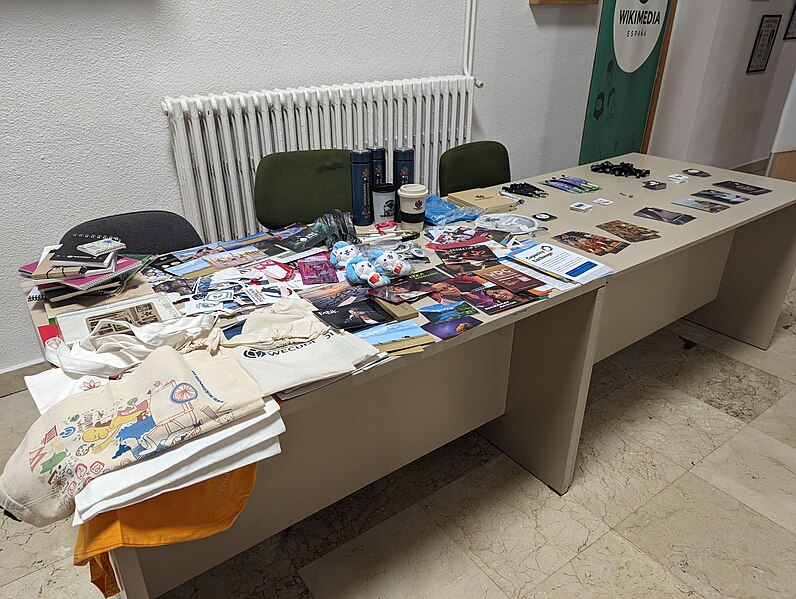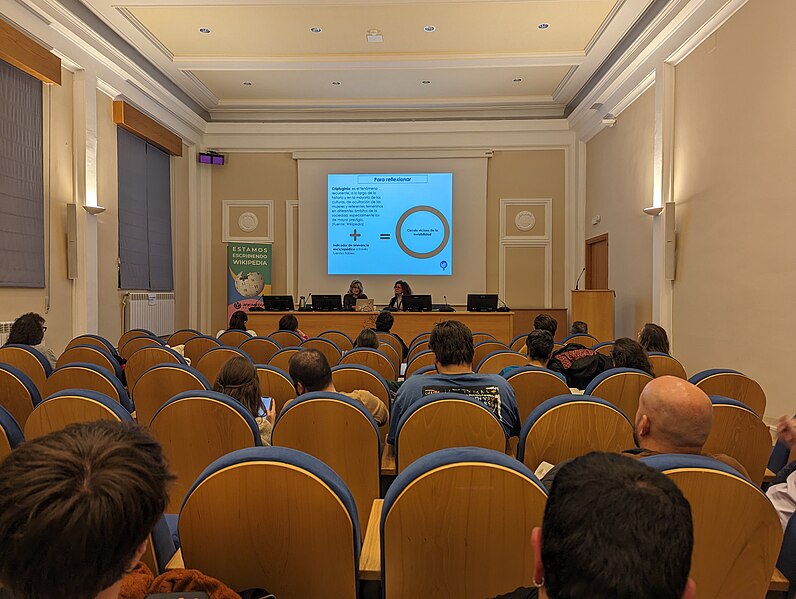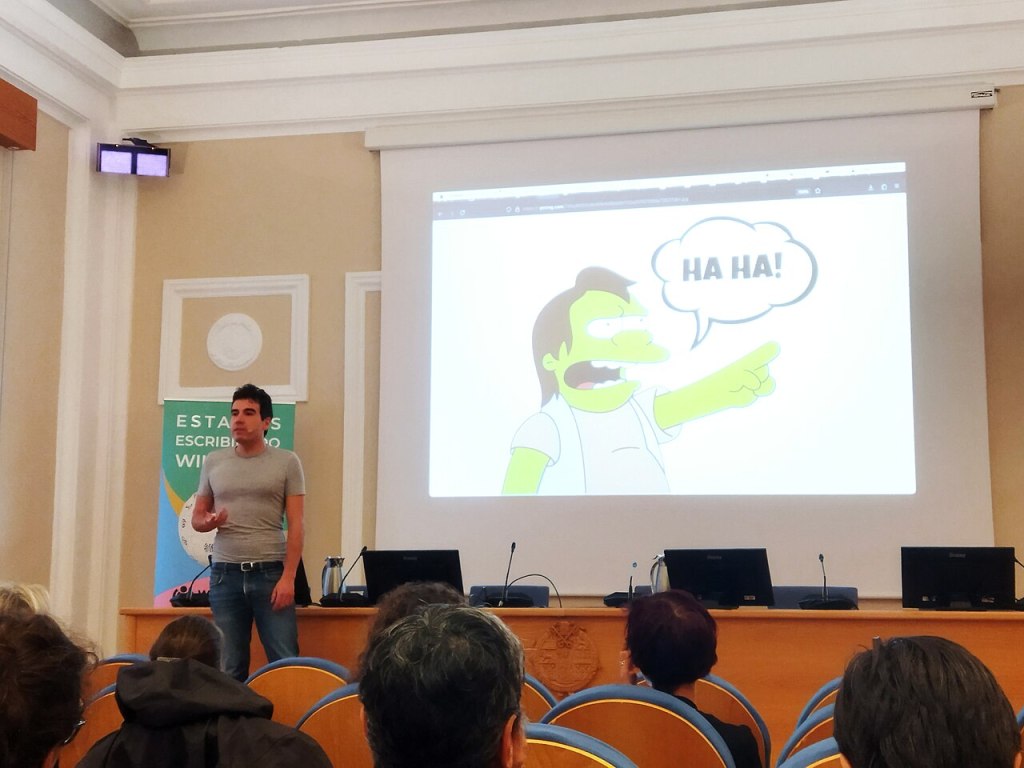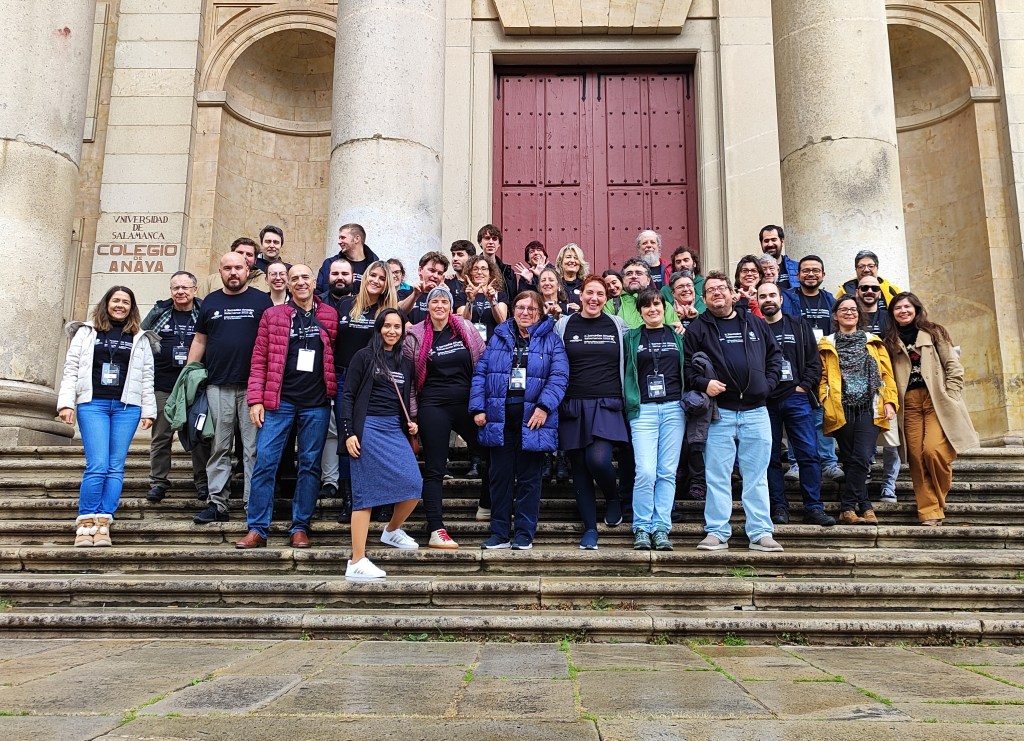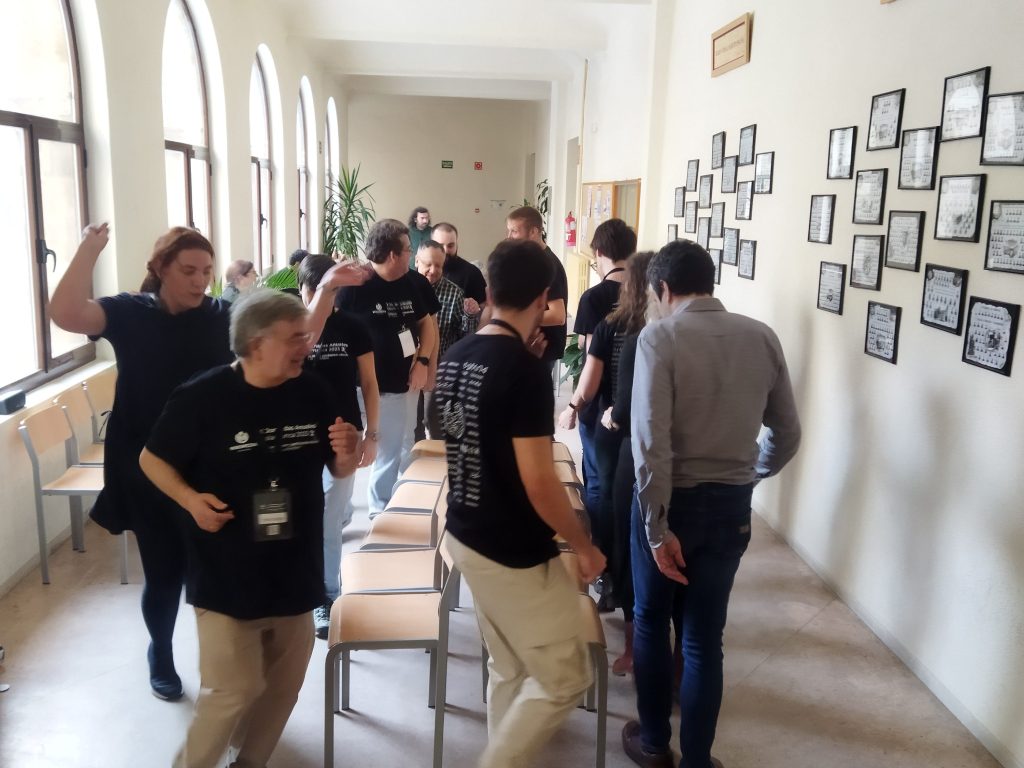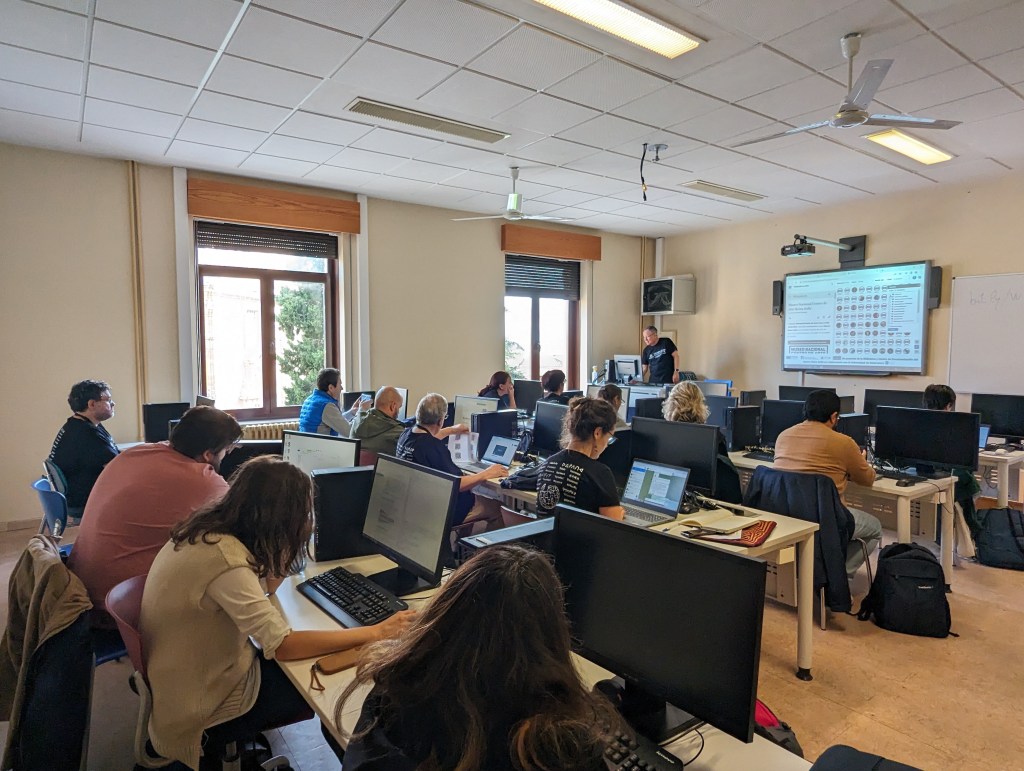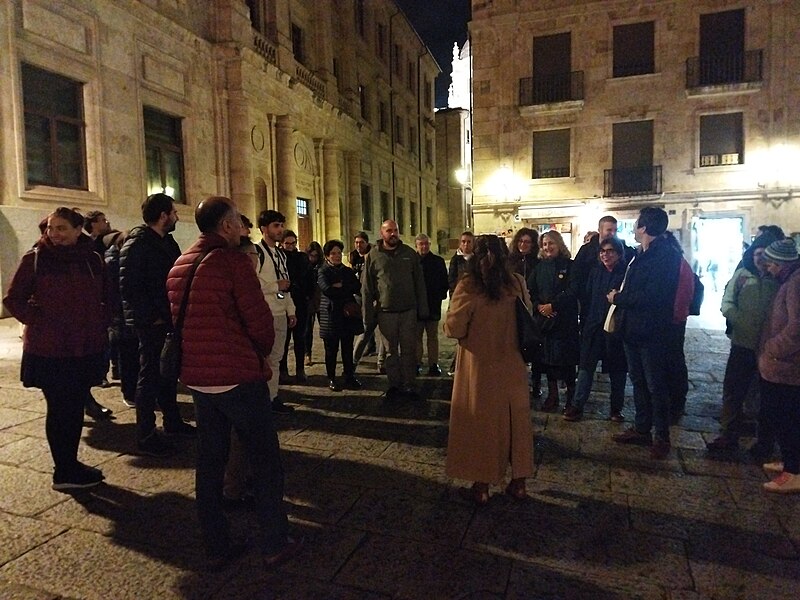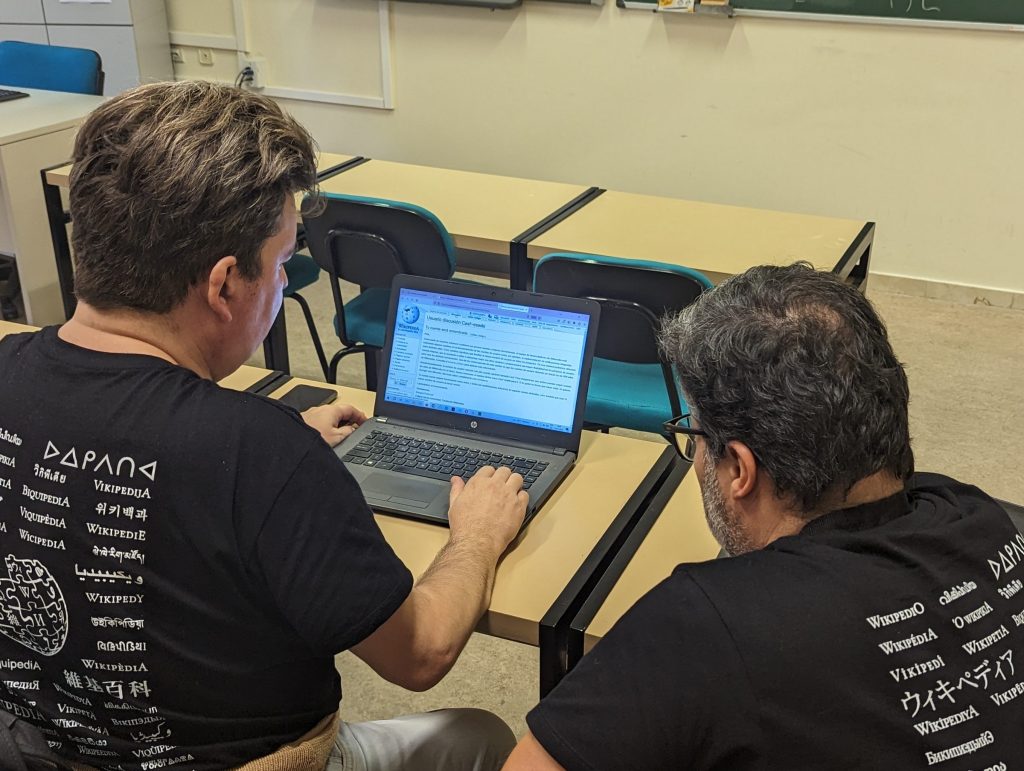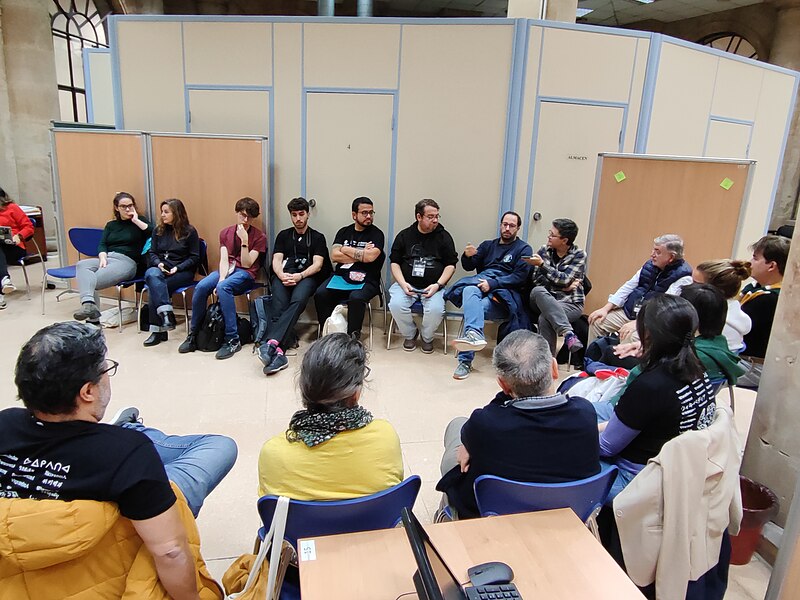From 10 to 12 November, a group of Wikimedians from different parts of Spain and Portugal, made their appearance in the emblematic Spanish city of Salamanca, to enjoy the beauty of its streets, to know closely its captivating history and culture, and, above all, to have the opportunity to meet again with people from the Wikimedia community. All this, under a common goal, to have a whole weekend dedicated to sharing knowledge, experiences, dreams, ideals, opinions and proposals in community.
This is how the Faculty of Translation and Documentation of the University of Salamanca, the oldest university in Spain, hosted our X Jornadas Anuales de Wikimedia España, under the slogan ‘Free Culture and Open Heritage’, alluding to our work during 2023.
Thanks to everyone who attended, as exhibitors, hosts, organisers and staff, guests, Wikimedian groups and Wikipedians; without your support and participation, our X Jornadas Anuales would not have been possible.
A weekend of great emotions and learning
The weekend was attended by a total of 44 Wikimedians, 47.7% women and 52.3% men. Among those who attended were the members of Wikimedia Spain; academics with recognised trajectory from the University of Salamanca and the King Juan Carlos University; specialists in transparency and Open Data; thematic editing groups such as Cuarto Propio, Wikiemakumeok and Geochicas; the Basque Wikimedistas user group; and professionals from Wikimedia Portugal and the Wikimedia Foundation. We had the great opportunity to count on their knowledge, experience and desire to add to the community.
In order to give more people the opportunity to participate, Wikimedia Spain granted a total of 14 scholarships for transport and accommodation. Thus, we had three lodgings close and totally accessible to the city centre, as well as to the Faculty of Translation and Documentation, the meeting place during the three days.
Launching the Wikimedia Spain Conference
On Friday 12th, from 4pm onwards, some Wikimedians started to arrive at the meeting point, some of them had just arrived in the city, while others had already been enjoying the food, the landscapes and the weather for half an afternoon.
After an hour of exchanging greetings, hugs and news, we went to the assembly hall of the faculty to start the conference with the ‘unofficial welcome’ from Florencia Claes, president of Wikimedia Spain, since the official welcome would be the next day when each confirmed participant would be present.
We then began with: “Art, science and gender through Wikimedia”, by Modesto Escobar, professor at the University of Salamanca and co-organiser of the conference. He opened the cycle of conferences by presenting the use that can be made of the multiple resources provided by Wikimedia, to interactively show different historical personalities in the fields of science and art, through a map of women throughout history.
For their part, the group of editors from Cuarto Propio presented “Editing Wikipedia from a feminist perspective”. In this way, they provided keys to identify sexism and androcentrism in Wikipedia, as well as tools to eliminate them. Through the selection of several articles by women and men, they illustrated various contents in which three clear gaps could be seen: of female editors, of articles and of contents; they also provided an important fact: in Spanish Wikipedia, there are currently 23% of articles by women, compared to 12% ten years ago.
To close Friday, the women’s group Wikiemakumeok announced the launch date of their recently released documentary, in which they explain the origin of their initiative and what they do on a weekly basis to achieve a balance between the biographies of women and men in Wikipedia, with the aim of achieving greater equality in the digital world. They also commented on their experience with Wikipedia editing activities in Basque that they organise in Vitoria and Durango.
Finally, we closed the day with a “Guided tour” of the Paraninfo and the Library of the University of Salamanca, led by professors Modesto Escobar and Ángel Zazo, hosts and co-organisers.
At the meridian of the Annual Conference
On Saturday 13th we started with the official welcome by Florencia Claes, where she once again expressed her gratitude to our host, the University of Salamanca, and to all the participants. Also, under some moving words, she highlighted all the great work done by the community during 2023 and encouraged to continue working on initiatives in favour of the promotion of free knowledge.
Inaugural conference: “Open Data”, presented by Jaime Gómez-Obregón, Open Data specialist. He gave a dynamic and interactive presentation where it was possible to learn about the work he has been promoting. He presented various cases in which he has worked, mainly with the impact that the project “elpreciodelagasolina.com” had on the ministry. In addition, he argued how other data that are not freely accessible could be released and used by open platforms that could make them available to the public, such as the mottos of the RAE, data from the Tax Agency, information from the Treasury’s tenderers, etc.
Next, “Generative Artificial Intelligence with open models”, by Jesús M. González-Barahona, professor at the King Juan Carlos University. He explained the notable progress made in recent years in generative machine learning (artificial intelligence) models such as ChatGPT and Llama (text) or DALL-E and Stable Diffusion (images). He also addressed the problems that can occur with the use of some of these tools, especially with regard to the intellectual property of images or videos generated by artificial intelligence programmes.
After this, the rooms branched off into workshops. One of them being “The Streets of Women by GeochicasOSM”, given by Carmen Diez from Geochicas; and “Wiki Loves Living Heritage in Wikidata: current status in Spain”, led by member Ismael Olea. Both presentations lasted 30 minutes.
This was followed by the workshops “Proposals for action to improve the local heritage of minor local entities in Wikimedia projects”, led by Mentxu Ramilo Araujo, vice-president of Wikimedia Spain; and the “Demo: Elaboration of web pages with Wikimedia content”, led by Modesto Escobar and Óscar Gutiérrez, from the University of Salamanca. Once the workshops were over, we returned again to the auditorium for the conference “Intellectual Property”, given by Miguel Ángel García, member of Wikimedia Spain. Through his presentation, Miguel Ángel gave the audience different options on how to increase the use of free materials, starting with the current regulations on intellectual property. To do so, he made a journey from the first regulations to their evolution in Spain and Europe and to the current regulations.
Annual Wikimedian traditions
With the aim of taking the traditional group photo of the Wikimedia Community in Spain, once Miguel Ángel’s lecture was over, the attendees were told to go to the Faculty of Philology, also known as the “Palacio de Anaya”, and located a few meters away from the Faculty of Translation and Documentation where we were. However, between conversations, consultations with the speaker, some detours, light rain, among other factors, forty-five minutes later, we obtained the present group photograph on the main stairs of the emblematic building.
After a pleasant meal at the restaurant “Las Caballerizas”, a few metres from where the group photo was taken, we returned to the faculty to continue with the conference, but not before celebrating the traditional Wikimedia Spain game: the “Musical chairs”. To the music of “Súbete a mi moto” by the endearing Mexican group “Menudo”, each participant walked dancing around a group of chairs strategically placed so that they would have to make a great effort to sit on them when the music stopped.
Those who participated barely managed to grab a seat. And after several laps around the chairs, which were disappearing proportionally as there were fewer participants, two finalists were left: Florencia Claes; together with Ignacio Casares (Nacaru), the youngest member participating in the Conference. After a tough competition, amidst laughter and near falls, Nacaru became the winner of the “Musical chairs 2023”.
Parallel Wikimedia Workshops
Saturday’s conference ended with a series of parallel practical and theoretical workshops, where participants could choose which one to attend based on their interest, proximity, or work to be done. To this end, the following were presented: “Wikidata and LGBTIQ+: workshop to edit the properties Gender Identity and Sexual Orientation”, by member Miguel Alan; the second part of the demo “Making web pages with Wikimedia content”, by Modesto Escobar; “Twinkle Lite, a tool that helps maintenance on Wikipedia”, by the winner of the “Musical chairs game”, Ignacio Casares; and “The National Library of Portugal and Wikimedia projects: A growing collaboration”, by Miguel Mimoso Correia, member of the Board of Wikimedia Portugal, and special guest of Wikimedia Spain.
After a short coffee break, the last workshops of the day continued. “Demo: Data acquisition in Wikipedia and Wikidata”, by Ángel Zazo from the University of Salamanca; “Reliability in scientific articles on Wikipedia and its impact on texts and materials in secondary and higher education”, by Gustavo Carrancio, member of Wikimedia Spain; “Extraction and use of Wiktionary etymologies in English”, dictated by Víctor Fresco Barbeito, member of Wikimedia Spain; “Ikusgela: Creating and adding free pedagogical videos to the Basque Wikipedia”, chaired by Ander Bolibar from the Basque Wikimedians User Group.
After a long day of conferences, workshops and traditional dynamics, and being the last night in the city, we could not leave without visiting and getting to know the different monuments and historical streets of Salamanca; so, through the Office of Tourism, Commerce and Economic Promotion of the Salamanca City Council, we organised a “Guided Tour” consisting of a panoramic outdoor visit through the historic centre of the city, lasting an hour and a half.
Despite the cold weather and the long walk, those who took part in the visit were eager to keep walking and get to know the ins and outs of the city, without missing anything along the way. Taking photos, analysing the monuments, identifying the astronaut on the façade of the New Cathedral of Salamanca, as well as looking for the well known Frog of Salamanca located on the façade of the Escuelas Mayores building of the University of Salamanca, which has become so important that it has become an icon of the city.
Closing of the conferences
The last conference was aimed at bringing together the different Wikimedia communities participating, whose theme is current and common within the community; therefore, the “Table on linguistic diversity” was proposed. On Catalan, with the participation of Ester Bonet and Koldo de Gibert, from Amical Wikimedia; on Basque, Aiora Mujika from the Basque Wikimedistas User Group; on Extremadura, Mentxu Ramilo from Wikimedia Spain; on Galician, Adrián Estévez from Galipedia; on Mirandese, Sofía Matias from Wikimedia Portugal and special guest from Wikimedia Spain.
During the round table, the various advances made by each of the representatives were highlighted. Ester and Koldo indicated that they are very active within Amical Wikimedia. Koldo also indicated that he is also an editor in Esperanto, a small but active community. However, they have problems with deletions because they put information in Esperanto as references.
On the Basque side, Aiora Mujika comments that this community is very active with many editing initiatives, and many academic contacts from different universities, so that their students can publish articles on the subjects of their speciality.
Regarding Extremaduran, with Mentxu, it is indicated that the Observatory of the Languages of Extremadura is trying to maintain Extremaduran, and that Güiquipedia can be an instrument to achieve this. Moreover, the evolution of the number of editors has been satisfactory, with an acceptable increase of editors and articles, achieving a balanced presence of articles between men and women, being the second Wikipedia in the languages of the peninsula, behind the Asturian one.
Regarding Galician, Adrián states that they are in 51st place in terms of the number of articles (200,000 written). There is a great deal of activity in the creation of articles in Galician municipalities, and many Galician editors work from locations all over the world.
Finally, regarding Mirandés, Sofía points out that, between 2008 and 2014, there was a lot of activity; however, in recent years it has decreased significantly. There are still 4,249 pages of content and 24 active editors, and many articles are automatically translated from Brazilian Portuguese. Based on this situation, an agreement has been promoted with the “Associaçao de Lhéngua i Cultura Mirandesa” (ALCM), which aims to promote the publishing community.
Learning Processes and Active Listening
During the 10th Annual Conference, we considered that we should set different formats to establish greater connection and interaction between the community; therefore, this year two activities were implemented for members to share and teach their knowledge, as well as to make their opinions, concerns and proposals for the future of the association known.
- Knowledge-sharing roundtables: what would you like to teach? Vs. what would you like to learn? Comprised of three thematic tables (Community, Content and Wikimedia projects, and Tools), where each participant had the opportunity to exchange different experiences, knowledge and know-how among the different participants. For this purpose, a room was available for each of the working tables, where they had a session to share topics in a relaxed atmosphere and discuss those points of interest to the community.
- Active Listening: “Building Community”. With the participation of 27 people, and with the aim of generating a common working space that allows us to share, evaluate and obtain a common and committed vision of Wikimedia Spain. This methodology was developed during two hours, being moderated by Menxtu Ramilo Araujo, vice-president of Wikimedia Spain, and Sara Santamaría, communication manager of Wikimedia Spain.
The process was divided into three blocks.
- Introductory block: where the objectives of the workshop, the process, and what we expect from the participants are expressed.
- Block of key questions that mark the interaction: How do you think we are seen from outside the Association? How do you see the association from the inside? What aspects would you need to carry out Wikimedian activities in your environment? What do you think are the possible challenges and opportunities we have as an Association?
- Final block “conclusion”: the conclusions of the “Active listening” are presented through a single word stated by each participant, creating from there a narrative of conclusions. The word that achieved the highest repetition was “diversity”.
In addition to the session, and considering that there was not much time to carry it out, other channels were provided so that those who had not been able to participate in person, could also send their contributions online or in writing, through: a ballot box and a blackboard within the faculty, and a digital form.
It should be noted that the results obtained from this ‘Active Listening’ process have been identified and analysed by the Board, in order to be considered for Wikimedia Spain’s 2024 strategy.
The “X Jornadas Anuales de Wikimedia España 2023”, held at the Faculty of Translation and Documentation of the University of Salamanca, have been a space for learning and an opportunity to share and exchange in community, great initiatives of the last year. Thus, those who attended, through a satisfaction survey, reflected that the most valuable aspects of this year were: the attention and willingness of the organising team, the knowledge and management of the speakers, and the strategic location of the venue.
This experience allowed ‘Sharing and the environment’ in community to be a prominent theme among the attendees, through a relaxed space where the group had the opportunity to dialogue, share and converse with tranquility and closeness. See you at the XI Annual Wikimedia Spain Conference!

Can you help us translate this article?
In order for this article to reach as many people as possible we would like your help. Can you translate this article to get the message out?
Start translation
